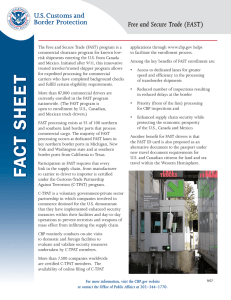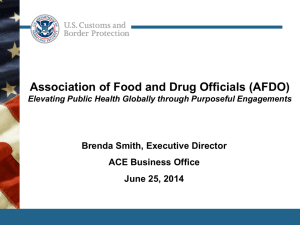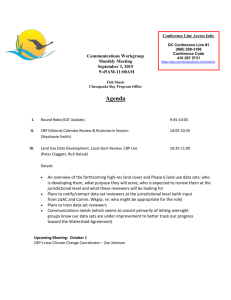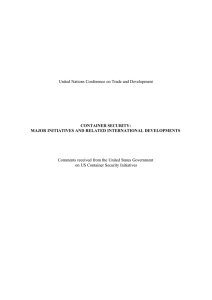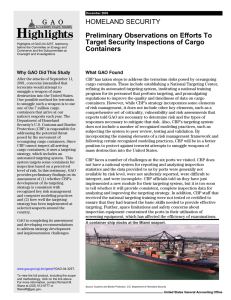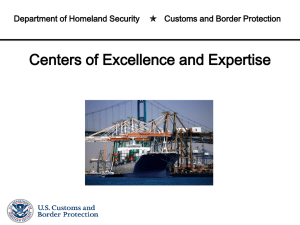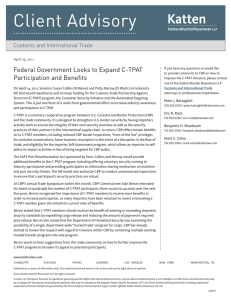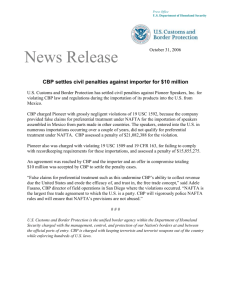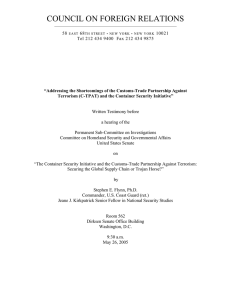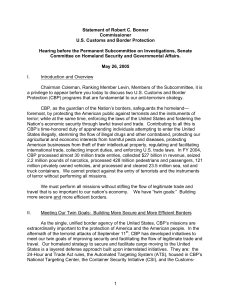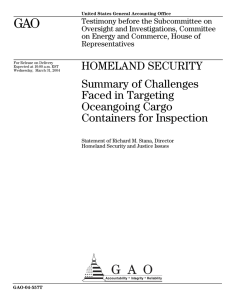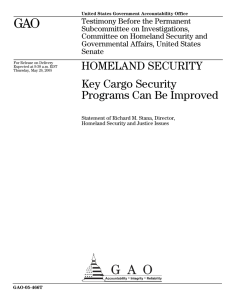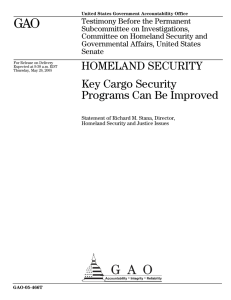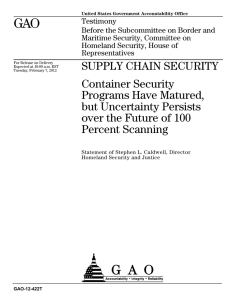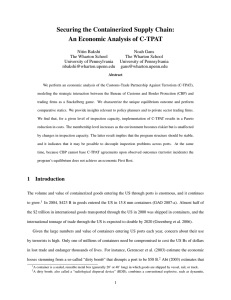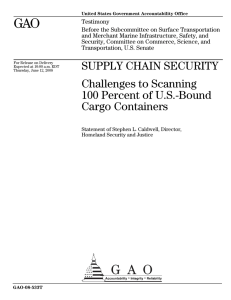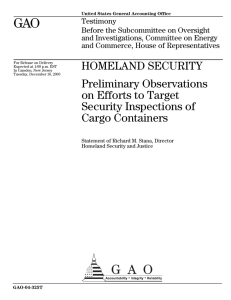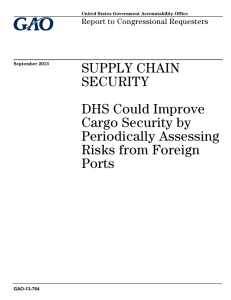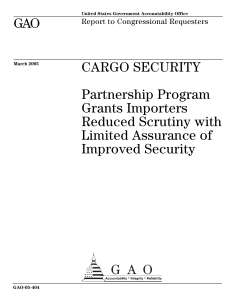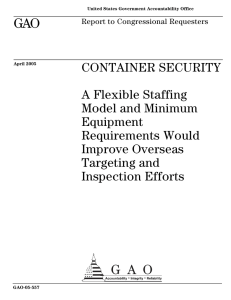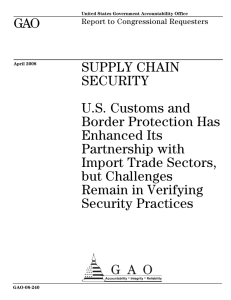SENATOR NORM COLEMAN
advertisement
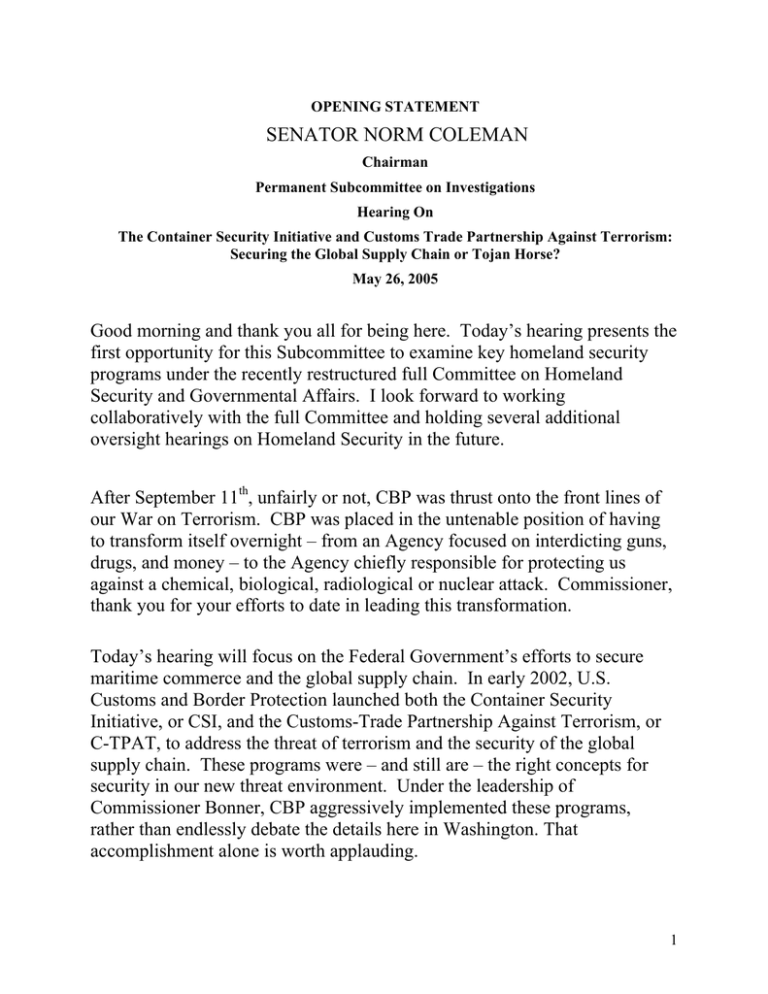
OPENING STATEMENT SENATOR NORM COLEMAN Chairman Permanent Subcommittee on Investigations Hearing On The Container Security Initiative and Customs Trade Partnership Against Terrorism: Securing the Global Supply Chain or Tojan Horse? May 26, 2005 Good morning and thank you all for being here. Today’s hearing presents the first opportunity for this Subcommittee to examine key homeland security programs under the recently restructured full Committee on Homeland Security and Governmental Affairs. I look forward to working collaboratively with the full Committee and holding several additional oversight hearings on Homeland Security in the future. After September 11th, unfairly or not, CBP was thrust onto the front lines of our War on Terrorism. CBP was placed in the untenable position of having to transform itself overnight – from an Agency focused on interdicting guns, drugs, and money – to the Agency chiefly responsible for protecting us against a chemical, biological, radiological or nuclear attack. Commissioner, thank you for your efforts to date in leading this transformation. Today’s hearing will focus on the Federal Government’s efforts to secure maritime commerce and the global supply chain. In early 2002, U.S. Customs and Border Protection launched both the Container Security Initiative, or CSI, and the Customs-Trade Partnership Against Terrorism, or C-TPAT, to address the threat of terrorism and the security of the global supply chain. These programs were – and still are – the right concepts for security in our new threat environment. Under the leadership of Commissioner Bonner, CBP aggressively implemented these programs, rather than endlessly debate the details here in Washington. That accomplishment alone is worth applauding. 1 However, these programs have been in existence for over 3 years and it is time to start asking some tough questions and identifying how we can improve upon these promising concepts. While I believe these programs are indeed the right concepts – our oversight investigation into these programs has revealed significant shortcomings that we will address here today. In concert with our efforts, the Government Accountability Office (GAO) conducted two extensive audits of these programs. These reports reveal some significant problems and outline the substantial work that is required to transition these promising initiatives into effective and sustainable programs. As Secretary Chertoff stated at our full Committee budget hearing in March, “the worst thing would be this: to have a program for reliable cargo that was insufficiently robust so that people could sneak in and use it as a Trojan Horse. That would be the worst of all worlds.” Rest assured that PSI will conduct the necessary sustained oversight to strengthen these programs and ensure that they are not used as a Trojan Horse by those whose very raison d’etre is to destroy us. If there was one thing my colleague Senator Kerry and President Bush agreed on in their debates this past fall, it was the threat of nuclear terrorism. When both were asked about the “single most serious threat to the national security of the United States, Senator Kerry responded “Nuclear proliferation. Nuclear proliferation.” In response, President Bush concurred and told the audience: “I agree with my opponent that the biggest threat facing this country is weapons of mass destruction in the hands of a terrorist network.” Senator Kerry and President Bush agreed because the stakes are so very high. In a recent estimate, a 10 to 20 kiloton nuclear weapon detonated in a major seaport would kill 50,000 to one million people and would result in direct property damage of $50 to $500 billion, losses due to trade disruption of $100 billion to $200 billion, and indirect costs of $300 billion to $1.2 trillion. This is unfathomable and demonstrates why these programs are essential to homeland security. Recently, Director Robert Mueller, ominously assessed the terrorist threat at the annual Global Intelligence Briefing by stating he is very concerned “with 2 the growing body of sensitive reporting that continues to show al-Qa’ida’s clear intention to obtain and ultimately use some form of chemical, biological, radiological, nuclear or high-energy explosives in its attacks against America.” Many terrorism experts believe that maritime container shipping may serve as an ideal platform to deliver these weapons to the United States. In fact, we recently saw that containers may also serve as ideal platforms to transport potential terrorists into the United States. This was demonstrated on January 15 and again on April 2 of this year when upwards of 30 Chinese immigrants were found emerging from containers arriving at the Port of Los Angeles. The Subcommittee’s concern is that smuggled immigrants could include members of terrorist organizations – and/or – that the container could have contained a Weapon of Mass Destruction. The Customs-Trade Partnership Against Terrorism, or C-TPAT, attempts to secure the flow of goods bound for the United States by developing voluntary partnerships with the trade community. C-TPAT members--primarily importers--commit to improving the security of their supply chain and provide CBP with their supply chain security profiles for review. In exchange for this commitment, CBP provides C-TPAT members benefits to include upwards of 7 times fewer inspection of their cargo at U.S. borders. Our concerns with C-TPAT include: • These substantial benefits – including fewer inspections – are provided to importers before a thorough review or validation of their supply chain security profiles. • And of those validations that occur, the process lacks any rigor or independence. To me, a validation is an independent physical audit of the supply chain security plan provide to CBP. However, CBP views a validation as an opportunity to “share best practices” and explicitly states that “validations are not audits.” Furthermore, of the 2676 certified C-TPAT importers receiving reduced inspections, only 6 percent (179) have been validated. Hence, 94 percent of the C-TPAT importers currently receiving 7 times fewer inspections have not 3 had their supply chain security personally validated by a CBP officer. This is simply unacceptable. The Container Security Initiative (CSI) was implemented to enable CBP to target high-risk containers for inspection at overseas ports prior to their departure for U.S. ports. Currently operating in 36 foreign ports, this program is based on the concept of “pushing our borders out.” While this concept is laudable, a review of CBP data by this Subcommittee and GAO raises significant concerns. Many CSI ports are unable to inspect the quantity of containers necessary to significantly improve security. Our Subcommittee has identified some CSI ports that routinely “waive” the inspection of highrisk containers, despite requests by CSI personnel for an inspection. As a result, numerous high-risk containers are not subjected to an examination overseas—thereby undermining the primary objective and purpose of CSI. More specifically – • CBP inspects approximately one-third of one percent of the total number of containers headed for U.S. shores from CSI ports. • Customs identified 1.95% of containers transiting through CSI ports in 2004 as high-risk. Of those containers deemed high-risk, only 17.5% are inspected overseas. • Equipment such as nuclear detection devices and non-intrusive inspection machines used overseas for inspections are untested and of unknown quality. • And CBP is unable to compare the performance of one CSI Port to another. While these findings are troubling, Customs has already moved aggressively to improve these programs by fulfilling the recommendations of the GAO audits. These changes are encouraging and worth highlighting. I look forward to Commissioner Bonner’s discussion of these substantial modifications. However, based on our oversight, I believe much work remains for Customs to build more robust and effective security programs – in partnership with industry – to confront the very real terrorist threat. 4 This partnership will entail a transformation of the trade community, whereby security becomes imbedded in the global supply chain. Instead of security being a cost of doing business – it needs to become a way of doing business. I would like to take this opportunity to thank Ranking Member Levin, Senator Collins, Senator Lieberman, and Representative Dingell for their support and interest in this important subject. Securing our nation’s ports and borders demands a bipartisan and bicameral approach. I would also like to thank Richard Stana of the GAO and his outstanding team of Stephen Caldwell, Deena Richart, and Kathryn Godfrey for producing two insightful reports that will contribute to improving our homeland security. I would like to welcome and thank the Commissioner Bonner of U.S. Customs and Border Protection; Director of the Homeland Security and Justice Team at GAO, Mr. Richard Stana, Commander Steven Flynn of the Council on Foreign Relations and Mr. Stewart Verdery, the former Department of Homeland Security Assistant Secretary for Border and Transportation Security for appearing before the Subcommittee today. I look forward to your testimony and an engaging hearing. 5
